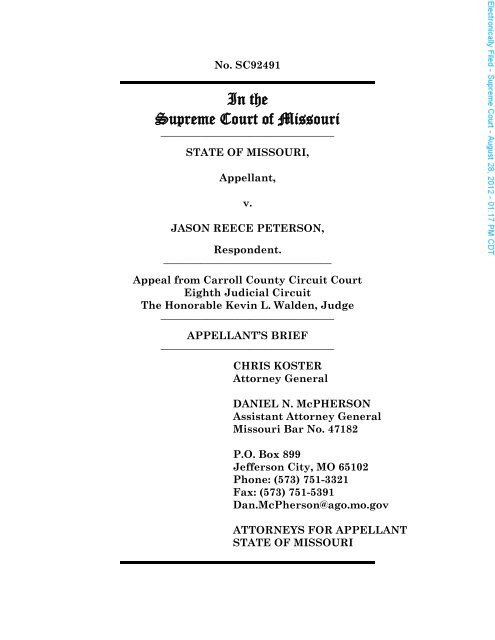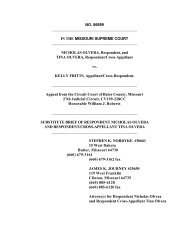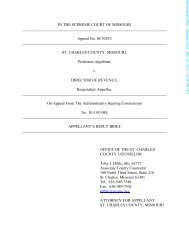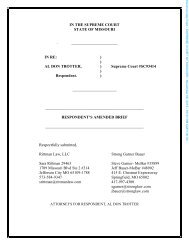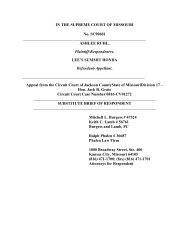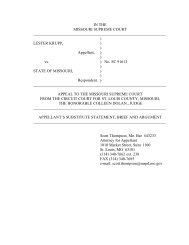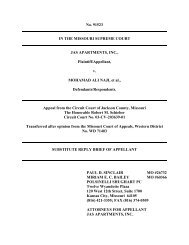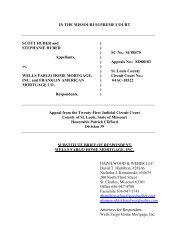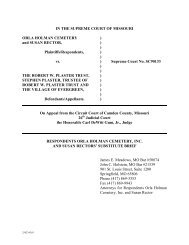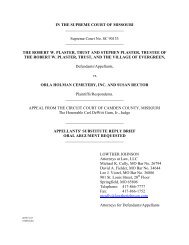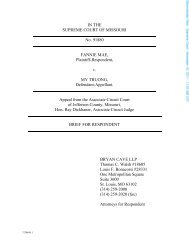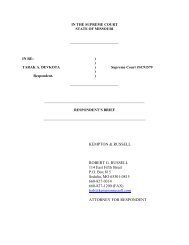In the Supreme Court of Missouri
In the Supreme Court of Missouri
In the Supreme Court of Missouri
You also want an ePaper? Increase the reach of your titles
YUMPU automatically turns print PDFs into web optimized ePapers that Google loves.
No. SC92491<br />
<strong>In</strong> <strong>the</strong><br />
<strong>Supreme</strong> <strong>Court</strong> <strong>of</strong> <strong>Missouri</strong><br />
_________________________________<br />
STATE OF MISSOURI,<br />
Appellant,<br />
v.<br />
JASON REECE PETERSON,<br />
Respondent.<br />
________________________________<br />
Appeal from Carroll County Circuit <strong>Court</strong><br />
Eighth Judicial Circuit<br />
The Honorable Kevin L. Walden, Judge<br />
_________________________________<br />
APPELLANT’S BRIEF<br />
_________________________________<br />
CHRIS KOSTER<br />
Attorney General<br />
DANIEL N. McPHERSON<br />
Assistant Attorney General<br />
<strong>Missouri</strong> Bar No. 47182<br />
P.O. Box 899<br />
Jefferson City, MO 65102<br />
Phone: (573) 751-3321<br />
Fax: (573) 751-5391<br />
Dan.McPherson@ago.mo.gov<br />
ATTORNEYS FOR APPELLANT<br />
STATE OF MISSOURI
TABLE OF CONTENTS<br />
TABLE OF AUTHORITIES .................................................................................2<br />
JURISDICTIONAL STATEMENT ......................................................................5<br />
STATEMENT OF FACTS ....................................................................................6<br />
POINT RELIED ON .............................................................................................8<br />
ARGUMENT .........................................................................................................9<br />
The trial court erred in dismissing criminal charges against <strong>the</strong><br />
defendant by applying <strong>the</strong> ban on retrospective laws contained in article I,<br />
section 13 <strong>of</strong> <strong>the</strong> <strong>Missouri</strong> Constitution because that provision is limited to<br />
civil rights and remedies ......................................................................................9<br />
CONCLUSION ................................................................................................... 24<br />
CERTIFICATE OF COMPLIANCE .................................................................. 25<br />
APPENDIX .................................................................................. Filed Separately<br />
1
Cases<br />
TABLE OF AUTHORITIES<br />
Doe v. Phillips, 194 S.W.3d 833 (Mo. banc 2006) ......... 10, 17, 17 n.3, 17 n.4, 21<br />
Ex parte Bethurum, 66 Mo. 545 (1877) ....................... 7, 8, 10, 11, 17 n.3, 18 n.4<br />
F.R. v. St. Charles County Sheriff’s Dept., 301 S.W.3d 56 (Mo. banc 2010)<br />
..................................................................................................... 12, 18, 19 n.5, 21<br />
Farmer v. Kinder, 89 S.W.3d 447 (Mo. banc 2002) .......................................... 13<br />
Franklin County ex rel. Parks v. Franklin County Comm’n, 269 S.W.3d 26<br />
(Mo. banc 2008) .............................................................................................. 9, 10<br />
<strong>In</strong> re R.W., 168 S.W.3d 65 (Mo. banc 2005) ................................................ 17, 20<br />
Jefferson County Fire Prot. Dists. Ass’n v. Blunt, 205 S.W.3d 866 (Mo. banc<br />
2006) ............................................................................................................... 8, 13<br />
Jerry-Russell Bliss, <strong>In</strong>c. v. Hazardous Waste Mgmt. Comm’n, 702 S.W.2d 77<br />
(Mo. banc 1986) .................................................................................................. 20<br />
Kansas City v. Keene Corp., 855 S.W.2d 360 (Mo. banc 1993) ........................ 21<br />
Lincoln Credit Co. v. Peach, 636 S.W.2d 31 (Mo. banc 1982) .......................... 16<br />
<strong>Missouri</strong> Real Estate Comm’n v. Rayford, 307 S.W.3d 686 (Mo. banc 2010) . 16<br />
Moore v. Brown, 350 Mo. 256, 165 S.W.2d 657 (Mo. banc 1942) ................. 8, 15<br />
R.L. v. Department <strong>of</strong> Corrections, 245 S.W.3d 236 (Mo. banc 2008)<br />
..................................................................................................... 12, 16, 17, 18, 21<br />
State v. Brown, 140 S.W.3d 51 (Mo. banc 2004) ..................................................5<br />
2
State v. Grady, 649 S.W.2d 240 (Mo. App. E.D. 1983) ............................... 22 n.6<br />
State v. Ma<strong>the</strong>ws, 328 S.W.2d 642 (Mo. 1959) ........................................... 22 n.6<br />
State v. Parker, 890 S.W.2d 312 (Mo. App. S.D. 1994) .............................. 22 n.6<br />
State v. Pribble, 285 S.W.3d 310 (Mo. banc 2009) ...................................... 22 n.6<br />
State v. Smo<strong>the</strong>rs, 297 S.W.3d 626 (Mo. App. W.D. 2009) ..................................5<br />
State v. Thomaston, 726 S.W.2d 448 (Mo. App. W.D. 1987) ............................ 16<br />
State v. Wadsworth, 203 S.W.3d 825 (Mo. App. S.D. 2006) ....................... 22 n.6<br />
State v. Young, 801 S.W.2d 378 (Mo. App. E.D. 1990) ............................... 22 n.6<br />
State ex rel. Ashcr<strong>of</strong>t v. Blunt, 813 S.W.2d 849 (Mo. banc 1991) .................... 15<br />
State ex rel. North v. Kirtley, 327 S.W.2d 166 (Mo. banc 1959)....................... 21<br />
State ex rel. Sweezer v. Green, 360 Mo. 1249, 232 S.W.2d 897 (1950)<br />
.............................................................................................................. 8, 20-21, 22<br />
State ex rel. Webster v. Myers, 779 S.W.2d 286 (Mo. App. W.D. 1989) ........... 16<br />
Statutes and Constitution<br />
Section 566.147, RSMo Cum. Supp. 2006 ........................................................ 11<br />
Section 566.150, RSMo Cum. Supp. 2009 .................................................. 5, 6, 8<br />
Section 589.426, RSMo Cum. Supp. 2008 ........................................................ 12<br />
Mo. Const. art. I, § 13 (1945) ..................................................................... 5, 8, 10<br />
Mo. Const. art. I, § 28 (1865) ................................................................... 8, 10 n.2<br />
Mo. Const. art. II, § 15 (1875) ................................................................. 8, 10 n.2<br />
Mo. Const. art. V, § 3 (as amended 1982) ............................................................5<br />
3
Mo. Const. art. XIII, § 17 (1820) ............................................................. 8, 10 n.2<br />
O<strong>the</strong>r Authority<br />
Debates <strong>of</strong> <strong>the</strong> <strong>Missouri</strong> Constitutional Convention, 1875, Vols. II, pp. 10,<br />
405-10, 447-48, and IV, pp. 94-95 (Isidor Loeb & Floyd C. Shoemaker eds.,<br />
State Historical Soc‟y <strong>of</strong> Mo. 1938) ....................................................... 13, 14, 15<br />
Debates <strong>of</strong> <strong>the</strong> 1943-1944 Constitutional Convention <strong>of</strong> <strong>Missouri</strong>, Vol. 6, p.<br />
1512, at http://digital.library.umsystem.edu.................................................... 15<br />
Terra A. Lord, Comment, Closing Loopholes or Creating More? Why a<br />
Narrow Application <strong>of</strong> SORNA Threatens to Defeat <strong>the</strong> Statutory Purpose, 62<br />
Okla. L. Rev. 273 (2010) .................................................................................... 20<br />
4
JURISDICTIONAL STATEMENT<br />
This appeal is from a judgment entered in <strong>the</strong> Circuit <strong>Court</strong> <strong>of</strong> Carroll<br />
County dismissing a felony indictment that charged Respondent Jason Reece<br />
Peterson with being a sex <strong>of</strong>fender present within 500 feet <strong>of</strong> a public park in<br />
violation <strong>of</strong> section 566.150, RSMo Cum. Supp. 2009, on <strong>the</strong> basis that<br />
application <strong>of</strong> <strong>the</strong> statute to <strong>the</strong> Respondent violated <strong>the</strong> prohibition<br />
contained in article I, section 13 <strong>of</strong> <strong>the</strong> <strong>Missouri</strong> Constitution on <strong>the</strong><br />
enactment <strong>of</strong> laws that are restrospective in <strong>the</strong>ir operation. A dismissal <strong>of</strong><br />
criminal charges based on <strong>the</strong> unconstitutionality <strong>of</strong> <strong>the</strong> underlying statute is<br />
a final judgment from which <strong>the</strong> State may appeal. State v. Brown, 140<br />
S.W.3d 51, 53 (Mo. banc 2004). Although <strong>the</strong> dismissal was denominated as<br />
being without prejudice, refiling <strong>the</strong> charge would be a futile act given <strong>the</strong><br />
reasons underlying <strong>the</strong> trial court‟s ruling. The dismissal thus had <strong>the</strong><br />
practical effect <strong>of</strong> terminating <strong>the</strong> litigation and constituted a final and<br />
appealable judgment. State v. Smo<strong>the</strong>rs, 297 S.W.3d 626, 630-31 (Mo. App.<br />
W.D. 2009). This appeal involves <strong>the</strong> validity <strong>of</strong> a state statute, section<br />
566.150, RSMo Cum. Supp. 2009. Therefore, <strong>the</strong> <strong>Supreme</strong> <strong>Court</strong> <strong>of</strong> <strong>Missouri</strong><br />
has exclusive appellate jurisdiction. Mo. Const. art. V, § 3 (as amended<br />
1982).<br />
5
STATEMENT OF FACTS<br />
Jason Reece Peterson was indicted in Ray County Circuit <strong>Court</strong> on<br />
June 17, 2011, on a single count <strong>of</strong> <strong>the</strong> class D felony <strong>of</strong> Loitering Within 500<br />
Feet <strong>of</strong> a Public Park or Swimming Pool, section 566.150, RSMo Cum. Supp.<br />
2009. (L.F. 2, 26-27). The indictment alleged that on or about September 20,<br />
2010, Peterson knowingly was present in real property comprising a public<br />
park with playground equipment or a swimming pool. (L.F. 26-27). The<br />
indictment also alleged that on or about January 20, 1998, Peterson had been<br />
found guilty in <strong>the</strong> Twenty-Fifth Judicial District <strong>of</strong> Louisiana <strong>of</strong> <strong>the</strong> crime <strong>of</strong><br />
<strong>In</strong>decent Behavior with a Juvenile, which would be a violation <strong>of</strong> Chapter 566<br />
RSMo if committed in this State. (L.F. 26).<br />
On August 3, 2011, Peterson filed a “Motion to Dismiss Charge as<br />
Unconstitutional.” (L.F. 4, 36-37). The motion alleged that <strong>the</strong> effective date<br />
<strong>of</strong> section 566.150, RSMo was August 29, 2010, and that his conviction in<br />
Louisiana occurred in 1997. 1 (L.F. 36). The motion fur<strong>the</strong>r alleged that an<br />
1 The actual effective date <strong>of</strong> section 566.150, RSMo would appear to be<br />
2009, and <strong>the</strong> State continued to allege that <strong>the</strong> date <strong>of</strong> Peterson‟s Louisiana<br />
conviction was 1998. (L.F. 38). Those discrepancies ultimately have no<br />
bearing on <strong>the</strong> disposition <strong>of</strong> <strong>the</strong> case, since Peterson‟s Louisiana conviction<br />
clearly predates <strong>the</strong> effective date <strong>of</strong> section 566.150, RSMo.<br />
6
essential element <strong>of</strong> <strong>the</strong> charge in <strong>the</strong> indictment was a conviction that<br />
preceded <strong>the</strong> effective date <strong>of</strong> section 566.150, RSMo. (L.F. 37). The motion<br />
<strong>the</strong>n alleged that because Peterson was convicted <strong>of</strong> <strong>the</strong> prior <strong>of</strong>fense before<br />
<strong>the</strong> effective date <strong>of</strong> <strong>the</strong> statute that he was being charged under, <strong>Missouri</strong>‟s<br />
ban on retrospective laws applied and <strong>the</strong> charge should be dismissed. (L.F.<br />
37). The State filed a Response to Defendant‟s Motion to Dismiss. (L.F. 4,<br />
38-47). The State argued that, based on this <strong>Court</strong>‟s precedent in Ex parte<br />
Bethurum, 66 Mo. 545 (1877), <strong>the</strong> constitutional ban on retrospective laws is<br />
limited exclusively to civil rights and remedies and has no application to<br />
crimes and punishment. (L.F. 38-47).<br />
Peterson filed an amended motion to dismiss in Carroll County Circuit<br />
<strong>Court</strong> after <strong>the</strong> case was transferred <strong>the</strong>re on his change <strong>of</strong> venue motion.<br />
(L.F. 110-11). The State filed a response that again argued that <strong>the</strong> ban on<br />
retrospective laws does not apply to criminal charges. (L.F. 137-154). The<br />
court issued an order on March 28, 2012, in which it found that <strong>the</strong><br />
constitutional ban on retrospective laws is not limited in applicability to civil<br />
cases, and that section 566.150, RSMo is an unconstitutional retrospective<br />
law as applied to Peterson. (L.F. 7, 155-56). The court granted Peterson‟s<br />
amended motion and dismissed <strong>the</strong> charge without prejudice. (L.F. 156).<br />
The State filed a Notice <strong>of</strong> Appeal in <strong>the</strong> Circuit <strong>Court</strong> on April 3, 2012. (L.F.<br />
7, 157-58).<br />
7
POINT RELIED ON<br />
The trial court erred in dismissing <strong>the</strong> felony indictment filed<br />
against Respondent Jason Reece Peterson because <strong>the</strong> statute under<br />
which Peterson was charged, section 566.150, RSMo, is not subject to<br />
<strong>the</strong> prohibition against enacting retrospective laws that is contained<br />
in article I, section 13 <strong>of</strong> <strong>the</strong> <strong>Missouri</strong> Constitution, in that section<br />
566.150, RSMo is a criminal statute and <strong>the</strong> ban on retrospective laws<br />
contained in article I, section 13 relates exclusively to civil rights<br />
and remedies and has no application to crimes and punishments.<br />
Ex parte Bethurum, 66 Mo. 545 (1877).<br />
Jefferson County Fire Prot. Dists. Ass’n v. Blunt, 205 S.W.3d 866 (Mo. banc<br />
2006).<br />
Moore v. Brown, 350 Mo. 256, 165 S.W.2d 657 (1942).<br />
State ex rel. Sweezer v. Green, 360 Mo. 1249, 232 S.W.2d 897 (1950).<br />
Mo. Const. art. I, § 13 (1945).<br />
Mo. Const. art. II, § 15 (1875).<br />
Mo. Const. art. I, § 28 (1865).<br />
Mo. Const. art. XIII, § 17 (1820).<br />
Section 566.150, RSMo Cum. Supp. 2009.<br />
8
ARGUMENT<br />
The trial court erred in dismissing <strong>the</strong> felony indictment filed<br />
against Respondent Jason Reece Peterson because <strong>the</strong> statute under<br />
which Peterson was charged, section 566.150, RSMo, is not subject to<br />
<strong>the</strong> prohibition against enacting retrospective laws that is contained<br />
in article I, section 13 <strong>of</strong> <strong>the</strong> <strong>Missouri</strong> Constitution, in that section<br />
566.150, RSMo is a criminal statute and <strong>the</strong> ban on retrospective laws<br />
contained in article I, section 13 relates exclusively to civil rights<br />
and remedies and has no application to crimes and punishments.<br />
The trial court dismissed <strong>the</strong> felony indictment filed against<br />
Respondent Peterson on <strong>the</strong> grounds that section 566.150, RSMo was<br />
retrospective as applied to him. But <strong>the</strong> trial court erred in applying <strong>the</strong><br />
constitutional ban against retrospective laws to <strong>the</strong> criminal statute under<br />
which Peterson was charged because <strong>the</strong> ban on retrospective laws relates<br />
exclusively to civil statutes and has no application to criminal statutes.<br />
A. Standard <strong>of</strong> Review.<br />
Constitutional challenges to a statute are reviewed de novo. Franklin<br />
County ex rel. Parks v. Franklin County Comm’n, 269 S.W.3d 26, 29 (Mo.<br />
banc 2008). A statute is presumed to be valid and will not be found<br />
unconstitutional unless it clearly contravenes a constitutional provision. Id.<br />
9
The person challenging <strong>the</strong> statute‟s validity bears <strong>the</strong> burden <strong>of</strong> proving that<br />
<strong>the</strong> act clearly and undoubtedly violates <strong>the</strong> constitution. Id.<br />
B. Analysis.<br />
The prohibition against retrospective laws is contained in article I,<br />
section 13 <strong>of</strong> <strong>the</strong> <strong>Missouri</strong> Constitution, which states:<br />
That no ex post facto law, nor law impairing <strong>the</strong> obligation<br />
<strong>of</strong> contracts, or retrospective in its operation, or making any<br />
irrevocable grants <strong>of</strong> special privileges or immunities, can be<br />
enacted.<br />
Mo. Const. art. I, § 13 (1945). A similar provision has been a part <strong>of</strong> <strong>Missouri</strong><br />
law since this State adopted its first constitution in 1820. 2 Doe v. Phillips,<br />
194 S.W.3d 833, 850 (Mo. banc 2006).<br />
A. This <strong>Court</strong> has construed <strong>the</strong> ban on retrospective laws as being<br />
limited to civil rights and remedies.<br />
The term “retrospective” that appears in each <strong>of</strong> <strong>Missouri</strong>‟s<br />
constitutions, including article I, section 13 <strong>of</strong> <strong>the</strong> present constitution, had<br />
acquired a definite, legal meaning long before <strong>the</strong> adoption <strong>of</strong> <strong>Missouri</strong>‟s first<br />
constitution. Ex parte Bethurum, 66 Mo.at 548. When a constitution<br />
2 See Mo. Const. art. XIII, § 17 (1820); Mo. Const. art. I, § 28 (1865); Mo.<br />
Const. art. II, § 15 (1875).<br />
10
employs words that have long had a technical meaning, as used in statutes<br />
and judicial proceedings, those words are to be understood in <strong>the</strong>ir technical<br />
sense, unless <strong>the</strong>re is something to show that <strong>the</strong>y were employed in a<br />
different sense. Id.<br />
The <strong>Court</strong> noted in Ex parte Bethurum that <strong>the</strong> prohibition against ex<br />
post facto laws served to prevent <strong>the</strong> retrospective application <strong>of</strong> criminal<br />
laws, while <strong>the</strong> phrase “law retrospective in its operation” related to civil<br />
rights and proceedings in civil causes. Id. at 550. Applying <strong>the</strong> technical<br />
meaning <strong>of</strong> retrospective that existed when <strong>the</strong> constitution was adopted, this<br />
<strong>Court</strong> stated, “A retrospective law, as <strong>the</strong> phrase is employed in our<br />
constitution, is one which relates exclusively to civil rights and remedies.” Id.<br />
at 550. And <strong>the</strong> <strong>Court</strong> found that <strong>the</strong> phrase retained that same meaning in<br />
both <strong>the</strong> 1865 and 1875 constitutions. Id. at 552. The <strong>Court</strong> went on to<br />
conclude, “[W]e think <strong>the</strong>re can be no doubt that <strong>the</strong> phrase „law retrospective<br />
in its operation,‟ as used in <strong>the</strong> bill <strong>of</strong> rights, has no application to crimes and<br />
punishments, or criminal procedure . . . .” Id. at 552-53.<br />
Despite that limitation, this <strong>Court</strong> has recently declared criminal<br />
statutes unconstitutional as violating <strong>the</strong> constitutional ban on retrospective<br />
laws. <strong>In</strong> R.L. v. Department <strong>of</strong> Corrections, <strong>the</strong> <strong>Court</strong> applied <strong>the</strong> ban on<br />
retrospective laws to section 566.147, RSMo Cum. Supp. 2006, a statute<br />
making it a felony for certain sex <strong>of</strong>fenders to reside within one-thousand feet<br />
11
<strong>of</strong> a school or a child care facility. R.L. v. Department <strong>of</strong> Corrections, 245<br />
S.W.3d 236, 237, 238 (Mo. banc 2008). <strong>In</strong> F.R. v. St. Charles County Sheriff’s<br />
Dept., <strong>the</strong> <strong>Court</strong> again declared that section 566.147, RSMo was<br />
retrospective. F.R. v. St. Charles County Sheriff’s Dept., 301 S.W.3d 56, 65-66<br />
(Mo. banc 2010). The <strong>Court</strong> also applied <strong>the</strong> ban on retrospective laws to<br />
uphold <strong>the</strong> dismissal <strong>of</strong> misdmeanor charges filed for a violation <strong>of</strong> section<br />
589.426, RSMo Cum. Supp. 2008, a statute that required registered sex<br />
<strong>of</strong>fenders to comply with certain requirements on Halloween. Id.<br />
Appellant respectfully suggests that R.L. and F.R. are contrary to this<br />
<strong>Court</strong>‟s precedents, to <strong>the</strong> understanding <strong>of</strong> <strong>the</strong> drafters <strong>of</strong> <strong>the</strong> constitution<br />
and <strong>the</strong> voters who approved it, and to <strong>the</strong> standards that this <strong>Court</strong> uses to<br />
construe <strong>the</strong> constitution. Those decisions should thus no longer be followed.<br />
B. The construction adopted in Ex Parte Bethurum is consistent<br />
with <strong>the</strong> understanding <strong>of</strong> <strong>the</strong> drafters.<br />
Adopted by a vote <strong>of</strong> <strong>the</strong> people, <strong>the</strong> <strong>Missouri</strong> Constitution is a direct<br />
expression <strong>of</strong> <strong>the</strong> public will. Accordingly, “[i]t is <strong>the</strong> duty <strong>of</strong> this <strong>Court</strong> to be<br />
faithful to <strong>the</strong> constitution. „[I]t cannot ascribe to it a meaning that is<br />
contrary to that clearly intended by <strong>the</strong> drafters. Ra<strong>the</strong>r, a court must<br />
undertake to ascribe to <strong>the</strong> words <strong>of</strong> a constitutional provision <strong>the</strong> meaning<br />
that <strong>the</strong> people understood <strong>the</strong>m to have when <strong>the</strong> provision was adopted.‟”<br />
12
Jefferson County Fire Prot. Dists. Ass’n v. Blunt, 205 S.W.3d 866, 872 (Mo.<br />
banc 2006) (quoting Farmer v. Kinder, 89 S.W.3d 447, 452 (Mo. banc 2002)).<br />
Ex Parte Bethurum was issued just two years after <strong>the</strong> adoption <strong>of</strong> <strong>the</strong><br />
1875 Constitution, and <strong>the</strong> judges who joined in <strong>the</strong> unanimous opinion were<br />
contemporaries <strong>of</strong> <strong>the</strong> delegates to <strong>the</strong> constitutional convention and almost<br />
certainly voted on <strong>the</strong> adoption <strong>of</strong> that constitution when it was presented to<br />
<strong>the</strong> public. The <strong>Court</strong> in Ex Parte Bethurum would have been well-attuned to<br />
<strong>the</strong> thinking <strong>of</strong> its fellow citizens who drafted and adopted <strong>the</strong> constitution.<br />
And <strong>the</strong> debates <strong>of</strong> <strong>the</strong> 1875 Constitutional Convention demonstrate that <strong>the</strong><br />
<strong>Court</strong> accurately captured <strong>the</strong> intended scope <strong>of</strong> <strong>the</strong> prohibition on laws<br />
retrospective in <strong>the</strong>ir operation.<br />
a. Debates <strong>of</strong> <strong>the</strong> relevant constitutional conventions<br />
demonstrate <strong>the</strong> drafters’ understanding that <strong>the</strong> ban on<br />
retrospective laws did not apply to criminal statutes.<br />
As originally introduced at <strong>the</strong> convention, <strong>the</strong> proposed article II,<br />
section 15 prohibited retrospective legislation but did not expressly include ex<br />
post facto laws and those impairing <strong>the</strong> obligation <strong>of</strong> contracts, both <strong>of</strong> which<br />
had been incorporated into <strong>the</strong> constitutions <strong>of</strong> 1820 and 1865. Debates <strong>of</strong><br />
<strong>the</strong> <strong>Missouri</strong> Constitutional Convention, 1875, Vol. II, p. 10 (Isidor Loeb &<br />
Floyd C. Shoemaker eds., State Historical Soc‟y <strong>of</strong> Mo. 1938). A substitute<br />
article II, section 15 was introduced that added those provisions and also<br />
13
prohibited any irrevocable grants <strong>of</strong> special privileges or immunities. Id.<br />
During debate on <strong>the</strong> substitute provision, a delegate named Gantt argued<br />
for <strong>the</strong> original proposal, which simply read, “no law retrospective in its<br />
operation shall be passed by <strong>the</strong> General Assembly.” Id. at 405. Delegate<br />
Gantt argued that adding a ban on ex post facto laws was unnecessary<br />
because an ex post facto law is a retrospective criminal law and would<br />
necessarily be included in a ban on laws retrospective in <strong>the</strong>ir operation. Id.<br />
at 405-10. That argument was challenged by ano<strong>the</strong>r delegate, who<br />
questioned why <strong>the</strong> 1820 Constitution would have banned both retrospective<br />
laws and ex post facto laws if <strong>the</strong> two terms really meant <strong>the</strong> same thing. Id.<br />
at 410. Despite Delegate Gantt‟s arguments, <strong>the</strong> convention adopted <strong>the</strong><br />
substitute provision that banned both ex post facto laws and laws<br />
retrospective in <strong>the</strong>ir operation. Id. at 447-48.<br />
During debate on <strong>the</strong> final adoption <strong>of</strong> section II, article 15, Delegate<br />
Gantt repeated his argument that <strong>the</strong> ban on retrospective laws was broad<br />
enough to encompass ex post facto laws and laws impairing obligations <strong>of</strong><br />
contracts. Id. at Vol. IV, pp. 94-95. He <strong>of</strong>fered an amendment so that <strong>the</strong><br />
section would read: “That no law retrospective in its operation or making any<br />
irrevocable grants <strong>of</strong> special privileges or immunities can be passed by <strong>the</strong><br />
General Assembly.” Id. at 95. That amendment was defeated and <strong>the</strong><br />
convention adopted article II, section 15 with <strong>the</strong> prohibitions on ex post facto<br />
14
laws, retrospective laws, and laws impairing <strong>the</strong> obligation <strong>of</strong> contracts. Id.<br />
at 95. The full context <strong>of</strong> <strong>the</strong> debate shows that Gantt‟s opinion was <strong>the</strong><br />
minority view, and that <strong>the</strong> majority <strong>of</strong> <strong>the</strong> delegates believed that analysis <strong>of</strong><br />
<strong>the</strong> retrospective effect <strong>of</strong> new criminal statutes should be confined to <strong>the</strong><br />
boundaries <strong>of</strong> <strong>the</strong> Ex Post Facto Clause.<br />
The present article I, section 13 was adopted at <strong>the</strong> constitutional<br />
convention <strong>of</strong> 1943-1944. Debates <strong>of</strong> <strong>the</strong> 1943-1944 Constitutional<br />
Convention <strong>of</strong> <strong>Missouri</strong>, Vol. 6, p. 1512, at http://digital.library.<br />
umsystem.edu. The only discussion prior to <strong>the</strong> vote approving <strong>the</strong><br />
amendment was to note that <strong>the</strong> new amendment was identical to article II,<br />
section 15 <strong>of</strong> <strong>the</strong> 1875 Constitution. Id. Both <strong>the</strong> delegates to <strong>the</strong> 1943-1944<br />
convention and <strong>the</strong> voters who adopted <strong>the</strong> constitution in 1945 are presumed<br />
to have known <strong>of</strong> <strong>the</strong> construction that this <strong>Court</strong> had placed on <strong>the</strong> term<br />
“retrospective” when <strong>the</strong>y approved <strong>the</strong> present article I, section 13. Moore v.<br />
Brown, 350 Mo. 256, 266-67, 165 S.W.2d 657, 662 (1942). And because <strong>the</strong><br />
term “retrospective” has been retained in <strong>the</strong> same context in every version <strong>of</strong><br />
<strong>the</strong> <strong>Missouri</strong> Constitution since Ex parte Bethurum, it is presumed to retain<br />
<strong>the</strong> original meaning ascribed by <strong>the</strong> <strong>Court</strong>. State ex rel. Ashcr<strong>of</strong>t v. Blunt,<br />
813 S.W.2d 849, 854 (Mo. banc 1991).<br />
When <strong>the</strong> rules that this <strong>Court</strong> has established for construing<br />
constitutional provisions are applied to article I, section 13, <strong>the</strong> term<br />
15
“retrospective” must be construed as applying exclusively to civil rights and<br />
remedies because that is how <strong>the</strong> term was understood by <strong>the</strong> convention<br />
that adopted that provision and by <strong>the</strong> voters who approved it. (See pp. 12-13<br />
supra). And since <strong>the</strong> passage <strong>of</strong> <strong>the</strong> present constitution, both this <strong>Court</strong><br />
and <strong>the</strong> <strong>Court</strong> <strong>of</strong> Appeals have continued to expressly recognize <strong>the</strong><br />
distinction that ex post facto laws as described in article I, section 13 are<br />
limited to crimes and punishment and criminal procedure, while<br />
retrospective laws as described in that same provision are limited to civil<br />
rights and remedies. See, e.g., Lincoln Credit Co. v. Peach, 636 S.W.2d 31,<br />
34-35 (Mo. banc 1982); <strong>Missouri</strong> Real Estate Comm’n v. Rayford, 307 S.W.3d<br />
686, 690 (Mo. App. W.D. 2010); State ex rel. Webster v. Myers, 779 S.W.2d<br />
286, 289 (Mo. App. W.D. 1989); State v. Thomaston, 726 S.W.2d 448, 459, 460<br />
(Mo. App. W.D. 1987).<br />
Even in R.L., <strong>the</strong> <strong>Court</strong> noted that, “The constitutional bar on<br />
retrospective civil laws has been a part <strong>of</strong> <strong>Missouri</strong> law since this State<br />
adopted its first constitution in 1820.” R.L., 245 S.W.3d at 237 (emphasis<br />
added). But despite that acknowledgement <strong>of</strong> <strong>the</strong> limited scope <strong>of</strong> <strong>the</strong> ban on<br />
retrospective laws, <strong>the</strong> <strong>Court</strong> applied that ban to invalidate a felony statute<br />
barring certain sex <strong>of</strong>fenders from residing within one-thousand feet <strong>of</strong> a<br />
school or a child care facility. Id. at 237, 238. That holding relied on <strong>the</strong><br />
<strong>Court</strong>‟s previous opinion in Doe v. Phillips, where <strong>the</strong> <strong>Court</strong> held that a<br />
16
statute requiring registration as a sex <strong>of</strong>fender for crimes committed before<br />
<strong>the</strong> effective date <strong>of</strong> <strong>the</strong> registration law imposed new obligations on <strong>the</strong><br />
<strong>of</strong>fender, and was thus retrospective as applied to those <strong>of</strong>fenders. Id. at 237<br />
(citing Phillips, 194 S.W.3d at 850). But <strong>the</strong> <strong>Court</strong> stated in Phillips that<br />
“„<strong>the</strong> thrust <strong>of</strong> <strong>the</strong> registration and notification requirements are civil and<br />
regulatory in nature.‟” Phillips, 194 S.W.3d at 842 (quoting <strong>In</strong> re R.W., 168<br />
S.W.3d 65, 70 (Mo. banc 2005)). 3<br />
b. Recent decisions extending <strong>the</strong> ban on retrospective laws to<br />
criminal statutes are inconsistent with <strong>the</strong> understanding <strong>of</strong> <strong>the</strong><br />
drafters and this <strong>Court</strong>’s precedent in Ex Parte Bethurum.<br />
The <strong>Court</strong> correctly applied <strong>the</strong> ban on retrospective laws to <strong>the</strong> sex<br />
<strong>of</strong>fender registration statute in Phillips since <strong>the</strong> statute was one that<br />
involved civil rights and remedies. 4 <strong>In</strong> R.L., <strong>the</strong> <strong>Court</strong> appears to have<br />
3 The <strong>Court</strong> also rejected a claim that <strong>the</strong> registration requirement was<br />
an ex post facto law on <strong>the</strong> basis that <strong>the</strong> bar on ex post facto laws applied<br />
only to criminal laws. Phillips, 194 S.W.3d at 842. That limitation on ex post<br />
facto laws is also found in Ex Parte Bethurum, 66 Mo. at 550.<br />
4 While <strong>the</strong> registration statute at issue in Phillips authorized criminal<br />
penalties for failure to comply, <strong>the</strong> <strong>Court</strong> found that provision was<br />
unimportant to <strong>the</strong> retrospective law analysis. Phillips, 194 S.W.3d at 852.<br />
17
extended Phillips to <strong>the</strong> school residency statute simply because both laws<br />
involved restrictions placed on persons convicted <strong>of</strong> sexual <strong>of</strong>fenses. See R.L.,<br />
245 S.W.3d at 237. <strong>In</strong> F.R. <strong>the</strong> <strong>Court</strong> in turn relied on R.L. and Phillips to<br />
again declare as retrospective <strong>the</strong> criminal statute prohibiting convicted sex<br />
<strong>of</strong>fenders from living within one-thousand feet <strong>of</strong> a school or child care<br />
facility, and to also invalidate as retrospective criminal charges filed under<br />
<strong>the</strong> statute creating a misdemeanor <strong>of</strong>fense when registered sex <strong>of</strong>fenders<br />
fail to comply with certain requirements on Halloween. F.R., 301 S.W.3d at<br />
65-66.<br />
Undersigned counsel has reviewed <strong>the</strong> briefs filed in R.L. and F.R., and<br />
none <strong>of</strong> <strong>the</strong>m address whe<strong>the</strong>r article I, section 13 can be applied to criminal<br />
statutes. <strong>In</strong>stead, <strong>the</strong> parties seemed to assume that since <strong>the</strong> ban on<br />
retrospective laws was applied in Phillips to <strong>the</strong> statute requiring sex<br />
<strong>of</strong>fender registration, it would equally apply to any statute restricting <strong>the</strong><br />
activities <strong>of</strong> sex <strong>of</strong>fenders. The <strong>Court</strong> thus was not asked to consider <strong>the</strong><br />
long-standing construction <strong>of</strong> article I, section 13, and <strong>the</strong> majority extended<br />
<strong>In</strong>deed, were a litigant to challenge enforcement <strong>of</strong> that criminal penalty<br />
under article I, section 13, <strong>the</strong> claim would have to be brought as an alleged<br />
ex post facto violation, not as a retrospective law. Ex parte Bethurum, 66 Mo.<br />
at 550.<br />
18
Phillips to <strong>the</strong> statutes being challenged in R.L. and F.R. 5 But in doing so,<br />
<strong>the</strong> <strong>Court</strong> construed article I, section 13 in a manner that was contrary to <strong>the</strong><br />
meaning <strong>of</strong> “retrospective” as understood when that provision was adopted.<br />
Ra<strong>the</strong>r than continue down that path, Appellant respectfully suggests<br />
that this <strong>Court</strong> should, consistent with <strong>the</strong> understanding <strong>of</strong> <strong>the</strong> drafters <strong>of</strong><br />
<strong>the</strong> constitution and <strong>the</strong> voters who approved it, reaffirm that article I,<br />
section 13‟s ban on retrospective laws is limited to civil rights and remedies,<br />
and that it does not apply to criminal statutes like section 566.150, RSMo.<br />
C. Excluding criminal statutes from <strong>the</strong> ban on retrospective laws<br />
advances <strong>the</strong> purposes behind <strong>the</strong> criminal laws.<br />
<strong>In</strong> addition to honoring <strong>the</strong> understanding <strong>of</strong> <strong>the</strong> Constitution‟s<br />
drafters, <strong>the</strong>re are o<strong>the</strong>r sound reasons why <strong>the</strong> ban on retrospective laws<br />
should not extend to criminal laws and punishments. The concern<br />
5 The dissent did discuss <strong>the</strong> 1875 Constitutional Convention and noted<br />
that <strong>the</strong> chief concern expressed in <strong>the</strong> debates over <strong>the</strong> prohibition against<br />
retrospective laws was to prevent <strong>the</strong> legislature from passing a retrospective<br />
law that would tread on citizens‟ financial or property interests. F.R., 301<br />
S.W.3d at 68-69 (Russell, J., dissenting). But <strong>the</strong> dissent did not discuss this<br />
<strong>Court</strong>‟s previous construction limiting <strong>the</strong> application <strong>of</strong> that prohibition to<br />
civil rights and remedies.<br />
19
motivating <strong>the</strong> ban on retrospective laws is to prevent situations where a<br />
person cannot avoid liability because all <strong>of</strong> <strong>the</strong> events necessary to impose<br />
liability have already occurred before <strong>the</strong> law‟s passage. Terra A. Lord,<br />
Comment, Closing Loopholes or Creating More? Why a Narrow Application <strong>of</strong><br />
SORNA Threatens to Defeat <strong>the</strong> Statutory Purpose, 62 Okla. L. Rev. 273, 305<br />
(2010). Applying <strong>the</strong> ban on retrospective laws to a civil obligation like sex<br />
<strong>of</strong>fender registration comports with <strong>the</strong> purpose behind <strong>the</strong> ban because once<br />
a person is convicted <strong>of</strong> a qualifying <strong>of</strong>fense <strong>the</strong>re is no way to avoid <strong>the</strong> civil<br />
registration requirement.<br />
But <strong>the</strong> same is not true <strong>of</strong> criminal statutes like section 566.150,<br />
RSMo. The concern that motivates <strong>the</strong> ban on retrospective laws is already<br />
addressed in <strong>the</strong> criminal law through <strong>the</strong> ban on ex post facto laws, which<br />
operates to prevent <strong>the</strong> legislature from retrospectively criminalizing conduct<br />
that was not criminal at <strong>the</strong> time it was committed. <strong>In</strong> re R.W., 168 S.W.3d<br />
at 68. Criminal statutes are thus forward looking. Section 566.150, RSMo,<br />
in particular, does not attempt to punish or adjudicate behavior that occurred<br />
prior to its effective date. Jerry-Russell Bliss, <strong>In</strong>c. v. Hazardous Waste Mgmt.<br />
Comm’n, 702 S.W.2d 77, 81 (Mo. banc 1986). It instead uses a person‟s prior<br />
convictions for felony <strong>of</strong>fenses to fix that person‟s status as one who is subject<br />
to <strong>the</strong> statutory restrictions and is liable for knowingly violating those<br />
restrictions. State ex rel. Sweezer v. Green, 360 Mo. 1249, 1255, 232 S.W.2d<br />
20
897, 901 (1950), overruled on o<strong>the</strong>r grounds by, State ex rel. North v. Kirtley,<br />
327 S.W.2d 166, 167 ((Mo. banc 1959). That is something that even <strong>the</strong> ban<br />
on retrospective laws permits. Id.; Phillips, 194 S.W.3d at 851. <strong>In</strong> Phillips<br />
this <strong>Court</strong> suggested that prior criminal convictions could be used to bar<br />
certain future conduct by <strong>the</strong> <strong>of</strong>fender. Id. at 852. That is precisely what<br />
section 566.150, RSMo does. And unlike <strong>the</strong> civil registration requirement<br />
that was found to be retrospective in Phillips, a prior felony <strong>of</strong>fender can<br />
avoid criminal liability under section 566.150, RSMo simply by refraining<br />
from <strong>the</strong> activities prohibited under <strong>the</strong> statute.<br />
But this <strong>Court</strong> has broadly applied <strong>the</strong> ban on retrospective laws to<br />
invalidate statutes that impose criminal liability for activity that occurs after<br />
<strong>the</strong> statute‟s effective date. R.L., 245 S.W.3d at 236, 237; F.R., 301 S.W.3d at<br />
65-66. Applying <strong>the</strong> ban on retrospective laws in that manner unduly<br />
restricts <strong>the</strong> legislature‟s ability to enact legislation that fur<strong>the</strong>rs <strong>the</strong> purpose<br />
<strong>of</strong> <strong>the</strong> criminal laws, which is “to protect and vindicate <strong>the</strong> interests <strong>of</strong> <strong>the</strong><br />
public as a whole, to punish <strong>the</strong> <strong>of</strong>fender and deter o<strong>the</strong>rs.” Kansas City v.<br />
Keene Corp., 855 S.W.2d 360, 378 (Mo. banc 1993). <strong>In</strong> enacting laws to fulfill<br />
that purpose, <strong>the</strong> legislature is free to recognize degrees <strong>of</strong> harm. Sweezer,<br />
360 Mo. at 1255, 232 S.W.2d at 901. The legislature is entitled to determine<br />
that sexual crimes against children are so serious that any level <strong>of</strong> recidivism<br />
is unacceptable and that affirmative steps aimed at deterring re<strong>of</strong>fending are<br />
21
necessary. See id. (legislature is entitled to exercise its police power by<br />
extending statutes to cases where it deems <strong>the</strong> need to be greatest and <strong>the</strong><br />
evil most apparent). The wisdom <strong>of</strong> that determination is not subject to<br />
judicial second-guessing. Id. Section 566.150, RSMo seeks to prevent future<br />
harm by providing a deterrent that will keep <strong>of</strong>fenders with a history <strong>of</strong><br />
preying on children away from areas that are frequented by large numbers <strong>of</strong><br />
children and that have been targeted in <strong>the</strong> past by pedophiles seeking<br />
victims, in this case public parks and public swimming pools. 6<br />
6 See, e.g., State v. Parker, 890 S.W.2d 312, 314 (Mo. App. S.D.<br />
1994) (defendant abducted 13, 11, and 10 year old girls in public park and<br />
molested two <strong>of</strong> <strong>the</strong> girls in park bathroom); State v. Young, 801 S.W.2d 378,<br />
379 (Mo. App. E.D. 1990) (defendant attempted to sodomize nine-year-old girl<br />
in restroom <strong>of</strong> public park); State v. Grady, 649 S.W.2d 240, 242 (Mo. App.<br />
E.D. 1983) (defendant forced nine-year-old boy into nearby park and<br />
sodomized him); State v. Ma<strong>the</strong>ws, 328 S.W.2d 642, 643 (Mo. 1959)<br />
(defendant approached eleven-year-old girl at public swimming pool and<br />
molested her). See also State v. Pribble, 285 S.W.3d 310, 312-13 (Mo. banc<br />
2009) and State v. Wadsworth, 203 S.W.3d 825, 830 (Mo. App. S.D. 2006). <strong>In</strong><br />
both cases <strong>the</strong> defendant drove to a public park for an arranged meeting to<br />
engage in sexual acts with a person that he thought was a young teenage girl<br />
22
The legislature‟s duty to promote public safety requires it to do more<br />
than just punish people who commit crimes. It also requires <strong>the</strong> enactment<br />
<strong>of</strong> laws designed to prevent crimes from happening in <strong>the</strong> first place. That<br />
duty is thwarted if <strong>the</strong> legislature cannot use a person‟s prior criminal history<br />
to fix that person‟s status under a statute prohibiting activity that is<br />
reasonably seen as increasing <strong>the</strong> risk <strong>of</strong> that person committing future<br />
crimes. Extending <strong>the</strong> ban on retrospective laws to criminal statutes cripples<br />
<strong>the</strong> legislature‟s ability to assess degrees <strong>of</strong> harm and take reasonable steps<br />
to decrease those risks. The concern over retrospective application <strong>of</strong><br />
criminal statutes is adequately addressed by <strong>the</strong> prohibition against ex post<br />
facto laws. This <strong>Court</strong> should <strong>the</strong>refore reaffirm <strong>the</strong> long-standing<br />
construction placed on article I, section 13 and find that <strong>the</strong> trial court erred<br />
in dismissing <strong>the</strong> charge against Respondent.<br />
that he had corresponded with over <strong>the</strong> internet, but who was actually an<br />
undercover police <strong>of</strong>ficer. The cases cited in this footnote by no means<br />
represent a comprehensive listing <strong>of</strong> cases involving actual or intended sexual<br />
assaults against children in public parks or swimming pools, but are merely<br />
illustrative.<br />
23
CONCLUSION<br />
<strong>In</strong> view <strong>of</strong> <strong>the</strong> foregoing, Appellant State <strong>of</strong> <strong>Missouri</strong> submits that <strong>the</strong><br />
judgment dismissing <strong>the</strong> felony indictment filed against Respondent Jason<br />
Reece Peterson should be reversed and <strong>the</strong> case should be remanded to <strong>the</strong><br />
trial court for reinstatement <strong>of</strong> <strong>the</strong> indictment and for fur<strong>the</strong>r proceedings<br />
consistent with this <strong>Court</strong>‟s opinion.<br />
Respectfully submitted,<br />
CHRIS KOSTER<br />
Attorney General<br />
/s/ Daniel N. McPherson<br />
DANIEL N. McPHERSON<br />
Assistant Attorney General<br />
<strong>Missouri</strong> Bar No. 47182<br />
P. O. Box 899<br />
Jefferson City, MO 65102<br />
Phone: (573) 751-3321<br />
Fax: (573) 751-5391<br />
ATTORNEYS FOR APPELLANT<br />
STATE OF MISSOURI<br />
24
I hereby certify:<br />
CERTIFICATE OF COMPLIANCE<br />
1. That <strong>the</strong> attached brief complies with <strong>the</strong> limitations contained in<br />
<strong>Supreme</strong> <strong>Court</strong> Rule 84.06, and contains 4,911 words as calculated pursuant<br />
to <strong>the</strong> requirements <strong>of</strong> <strong>Supreme</strong> <strong>Court</strong> Rule 84.06, as determined by Micros<strong>of</strong>t<br />
Word 2007 s<strong>of</strong>tware; and<br />
2. That a copy <strong>of</strong> this notification was sent through <strong>the</strong> eFiling system<br />
on this 28th day <strong>of</strong> August, 2012, to:<br />
Scott Cameron Hamilton<br />
9 South 11th Street<br />
Lexington, <strong>Missouri</strong> 64067-0280<br />
/s/ Daniel N. McPherson<br />
DANIEL N. McPHERSON<br />
Assistant Attorney General<br />
<strong>Missouri</strong> Bar No. 47182<br />
P.O. Box 899<br />
Jefferson City, <strong>Missouri</strong> 65102<br />
Phone: (573) 751-3321<br />
Fax (573) 751-5391<br />
ATTORNEYS FOR APPELLANT<br />
STATE OF MISSOURI<br />
25


